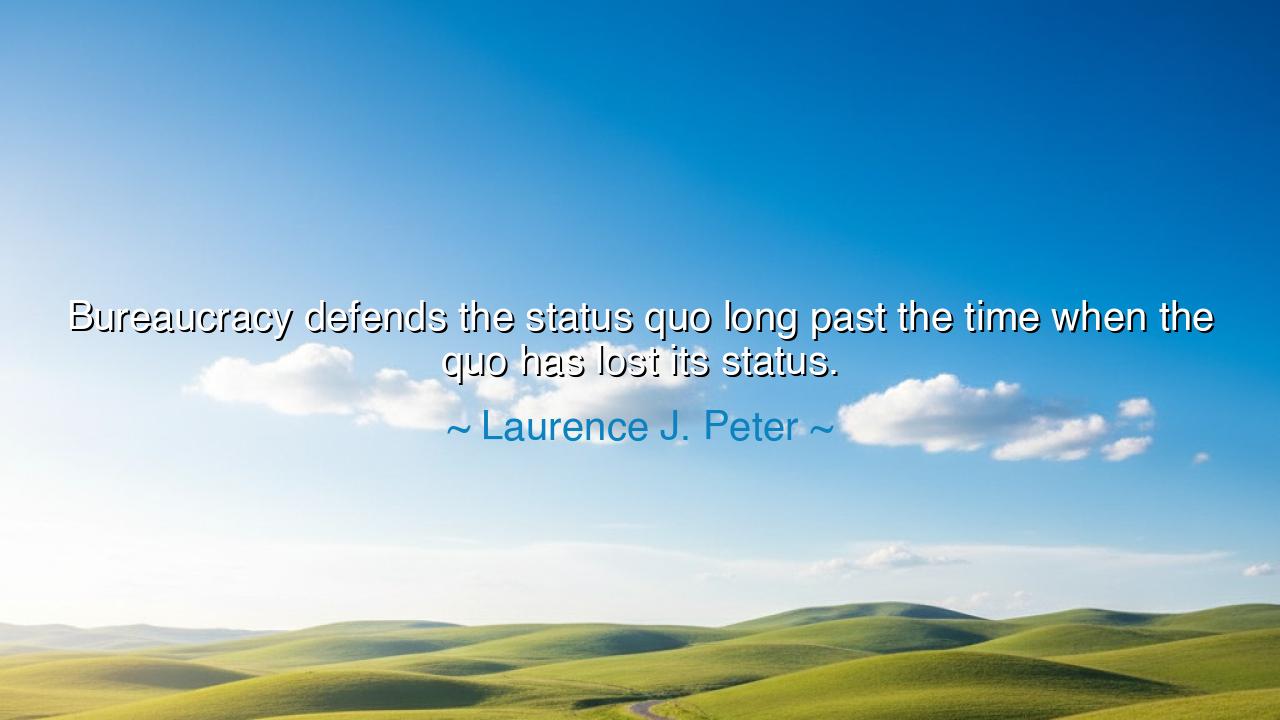
Bureaucracy defends the status quo long past the time when the
Bureaucracy defends the status quo long past the time when the quo has lost its status.






The words of Laurence J. Peter, “Bureaucracy defends the status quo long past the time when the quo has lost its status,” are a cry against the sluggishness of human institutions. They reveal the tendency of systems, once created to serve life, to become chains that bind it instead. What begins as order, meant to give stability and direction, can harden into rigidity, clutching desperately to old ways long after they have grown useless or even harmful. This is the tragedy of the status quo—that it is often guarded, not because it is good, but because it simply exists.
Peter, famed for his writings on organizational folly, knew well the nature of bureaucracy. He observed that the very structures built to aid efficiency often become ends in themselves, clinging to power and process even as reality moves on. His words are not merely criticism but warning: beware the machinery of governance and institutions, for once set in motion, they may serve their own survival rather than the needs of the people. His voice joins the wisdom of the ancients, who often told of kings and councils who could not adapt, and thus fell when new winds swept across history.
Consider the fall of the Byzantine Empire. For centuries, it was a fortress of learning and faith, yet it grew heavy with bureaucracy, drowning in rules, taxes, and inflexible tradition. While its enemies adapted with fresh strategies and alliances, Byzantium clung to systems that no longer served its survival. By the time the Ottomans laid siege to Constantinople, the empire’s spirit had long since withered beneath the weight of its own machinery. The quo had indeed lost its status, yet the defenders of bureaucracy clung to it until the walls fell.
The meaning of Peter’s words extends beyond empires to every sphere of life. Organizations, governments, and even households can fall into the trap of defending customs long after their purpose has died. We see schools teaching by rote in an age that demands creativity. We see offices demanding endless forms when innovation is what is needed. We see laws clung to though their justice has expired. The status quo becomes an idol, and bureaucracy becomes its priest, offering sacrifice not to progress, but to preservation of the old.
Yet Peter’s wisdom is not meant to sow despair, but vigilance. Time is the great teacher, and it whispers that change is constant. What was once wise may become folly, and what was once needed may become burden. A society that cannot shed old skins is like a serpent that refuses to molt: it suffocates within its own shell. The heart that clings to the past, without discernment, becomes blind to the opportunities of the present.
The lesson is this: honor tradition, but do not worship it. Ask always whether the quo still deserves its status. If it nourishes, keep it; if it hinders, let it go. True wisdom is the balance between roots and wings: to stand firm where firmness is needed, but to rise and adapt when the winds shift. Bureaucracy that cannot bend will break, but leadership that adapts will endure.
Practical action lies in courage. In your own life, do not keep habits or rules merely because they are old. Test them against truth and usefulness. In your work, resist blind obedience to process; instead, ask whether it still serves its purpose. In your community, do not defend the status quo when it has lost its life; instead, breathe new spirit into it, or replace it with something greater. For in this way, you will not be a defender of empty forms, but a guardian of living wisdom.
Thus, in the voice of the ancients, we proclaim: Blessed are those who honor the past but are not enslaved to it. Blessed are those who see when the quo has lost its status, and dare to build anew. For life is change, and those who adapt to it walk in harmony with the eternal flow. Let Peter’s words be a lamp against the shadows of bureaucracy, and let us remember always that systems are meant to serve life, not the other way around.






AAdministratorAdministrator
Welcome, honored guests. Please leave a comment, we will respond soon